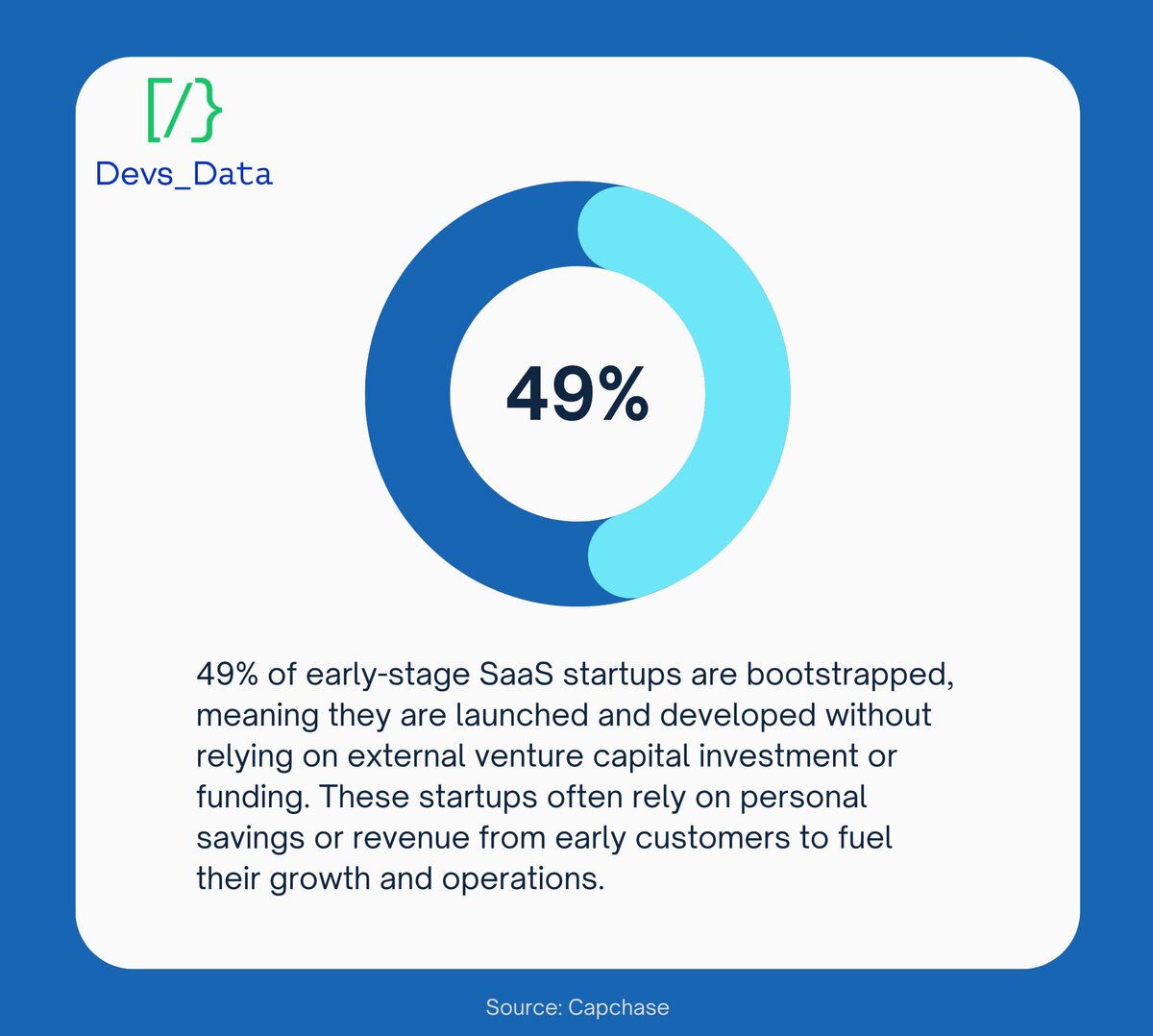


Building a SaaS business without external funding may seem challenging, but it’s a rewarding and empowering path that many successful entrepreneurs have taken.
According to a recent report by Capchase, approximately 49% of early-stage SaaS startups are bootstrapped, meaning they launch without venture capital funding. For example, bootstrapped SaaS companies with $3M to $20M in Annual Recurring Revenue (ARR) experienced 100% net revenue retention in 2024, with a median ARR per full-time employee of $125000. This highlights their remarkable ability to maintain high customer loyalty. By relying on personal resources, revenue, and ingenuity, founders can build resilient, customer-focused businesses that thrive on innovation and adaptability.

These companies often develop stronger customer relationships, focusing on delivering real value without the pressure of meeting investor expectations. This guide provides key strategies, practical tips, and expert insights to help you successfully navigate the challenges of bootstrapping a SaaS business while driving sustainable growth.
Bootstrapping refers to building and scaling a business using your capital and resources rather than relying on external funding or investors. The term comes from the phrase “to pull oneself up by one’s bootstraps,” which was once thought impossible. In the world of SaaS, bootstrapping means using revenue, cash flow, and personal savings to finance development, marketing, and operations. While it requires more effort and creativity, bootstrapping fosters greater independence and allows founders to build businesses on their terms.
Bootstrapping provides SaaS founders with complete control over their business decisions. Without external investors or stakeholders, founders aren’t pressured to meet outside expectations or maximize short-term profits. This autonomy allows founders to create a company culture and vision that aligns with their personal values, resulting in a more authentic business. Moreover, founders can prioritize long-term goals and sustainable growth over short-term financial gains, which often leads to more thoughtful, strategic decision-making. This freedom makes it easier to adapt the business model, make bold moves, or experiment with new features and innovations, which are crucial for staying competitive in the SaaS market.
One of the significant benefits of bootstrapping is that it allows SaaS businesses to focus on the customer rather than external investors’ demands. When a company isn’t beholden to investors or venture capital firms, it has the flexibility to prioritize customer satisfaction and retention. Founders can devote more resources to understanding their target audience, listening to feedback, and refining their products based on real user experiences. This results in products that more accurately meet customer needs, increasing customer loyalty, higher lifetime value, and organic word-of-mouth growth. Since bootstrapped companies don’t rely on large marketing budgets or paid acquisition strategies, this organic growth is often more sustainable and cost-effective in the long run.
Bootstrapped businesses enjoy a level of agility and sustainability that investor-backed companies might lack. They can quickly pivot their business model, alter product features, or adjust marketing strategies without needing approval from external parties. This agility is crucial in the fast-paced SaaS industry, where market demands, technology, and customer preferences shift rapidly. Bootstrapped companies can embrace innovation and experiment with new ideas without the fear of investor backlash or pressure to meet predefined milestones. This freedom fosters a culture of creativity, encouraging founders to explore unconventional solutions, experiment with disruptive technologies, and remain at the forefront of industry trends. The ability to adapt quickly can be a significant competitive advantage, allowing bootstrapped companies to outperform more prominent and rigid competitors.
Do you have software development needs?
Bootstrapped companies often work with limited resources, which forces them to prioritize their spending and find the most efficient ways to allocate funds. This can lead to better decisions regarding product development, marketing, and hiring, encouraging the use of low-cost tools, automation, and smart outsourcing. Operating on a tight budget helps businesses avoid unnecessary expenses, ensuring that every dollar spent contributes to the company’s long-term success. Furthermore, without the need to meet investor expectations or burn through large amounts of capital, bootstrapped SaaS businesses can focus on generating revenue early and reinvesting profits for sustainable growth.

One of the biggest challenges for bootstrapped SaaS companies is managing financial resources. Without external funding, founders must rely solely on their own revenue, which can be limited, especially in the early stages. This constraint means careful financial planning is essential. Every investment decision, whether for product development, marketing, or hiring, must be made with a clear understanding of its return on investment. Bootstrapped businesses often need to make tough choices on where to allocate funds, prioritizing what will have the most immediate and lasting impact on growth.
When bootstrapping, companies often experience pressure to balance rapid growth with long-term stability. Scaling too quickly can strain available resources, resulting in operational inefficiencies or overextending staff. Conversely, overly cautious growth strategies can cause a business to miss valuable market opportunities. One way to ensure a more balanced approach is by focusing on equity distribution and reinvestment practices.
For example, using the Slicing Pie model for equity distribution ensures that team members, founders, and investors are rewarded fairly based on their actual contributions over time. This creates flexibility in rewarding stakeholders as the company grows, particularly in bootstrapped startups where upfront equity allocation may not be feasible. Similarly, reinvesting at least 50% of profits into the business ensures a steady capital flow for product development, marketing, and scaling operations, which is critical for sustainable growth.
Finding the right balance between scaling too quickly and not growing enough is critical for long-term success. This requires well-thought-out strategic planning, proper equity distribution, and consistent reinvestment practices, ensuring that growth is sustainable and stable while positioning the company to take advantage of market shifts.
In a competitive market, bootstrapped companies may struggle to compete against larger, well-funded rivals who can pour money into extensive marketing campaigns. Without the same financial backing, these companies need to rely on organic growth strategies. This often means focusing on strategic branding, leveraging word-of-mouth marketing, and building strong customer relationships to drive growth. Although bootstrapped businesses may not have the same marketing budget, their agility and ability to innovate often give them an edge, enabling them to stand out in a crowded market.
Maintaining positive cash flow is a constant concern for bootstrapped companies. Without the cushion of external funding, it’s essential to ensure that revenue consistently exceeds expenses to avoid running into financial trouble. Mismanagement of cash flow can create bottlenecks in operations, delaying product development or stalling marketing efforts. To overcome this, bootstrapped businesses need to focus on maintaining a healthy cash flow by keeping expenses lean, optimizing revenue generation, and reinvesting profits to fuel future growth.
Resource limitations in a bootstrapped company can make it difficult to balance product development, customer support, and operational demands. Founders may face challenges in maintaining high-quality standards while also innovating to meet changing customer needs. To address this, bootstrapped companies must get creative, finding cost-effective ways to support product updates, new feature development, and efficient customer service. Leveraging open-source tools, outsourcing non-core activities, and streamlining operations are all strategies that can help maintain quality and innovation without draining resources.

We’ve discussed the challenges bootstrapped startups face, and now it’s time to address one of the key solutions – choosing the right tools. For startups, selecting the right tools is crucial for streamlining operations, boosting productivity, and creating a strong foundation for growth. The right resources can help founders overcome common obstacles, reduce costs, and accelerate development without sacrificing quality. Below are some of the most popular and effective tools that can help early-stage startups thrive.
Notion is a powerful all-in-one workspace that helps teams organize their work. It combines project management, note-taking, databases, and collaboration features. For startups, Notion is ideal for tracking tasks, managing projects, creating knowledge bases, and collaborating on team goals. Its flexibility makes it a perfect tool for any startup looking to stay organized and efficient.
Webflow is an intuitive web development platform that allows users to design, build, and launch responsive websites without needing advanced coding skills. With its drag-and-drop interface, Webflow lets teams rapidly create and launch websites, making it an excellent choice for startups that need to establish an online presence quickly. It’s a great option for founders who want to focus on business growth without getting bogged down by the complexities of traditional web development.
For eCommerce startups, Klaviyo offers a powerful email marketing tool that integrates with platforms like Shopify. It allows startups to create automated email campaigns, manage subscriber lists, and analyze performance metrics.
ActiveCampaign is a robust email marketing and automation platform designed to help startups grow and engage their audience. It offers advanced segmentation, email automation, and personalized messaging, allowing businesses to deliver highly tailored content to their customers. ActiveCampaign also provides CRM capabilities, making it easier for startups to manage customer relationships and improve conversion rates.

Before diving into product development, it’s critical to validate your business idea. Instead of spending resources building a product no one wants, test your concept to measure market interest. This can be done through landing pages, where potential customers can sign up for more information or pre-order the product, or by creating demo videos and email campaigns. The goal is to test if there’s a real demand for your solution before committing significant time or money. Early validation helps prevent wasted effort and increases the chances of success when you eventually launch.
The MVP approach focuses on building the simplest version of your product that addresses the core problem your customers face. Rather than developing a fully featured product right away, prioritize the essential features that demonstrate the value of your solution. One effective way to rapidly test ideas is through rapid prototyping, where you create early mockups of your product using graphical tools like MockFlow – a popular wireframing and prototyping tool that allows you to visualize screens, plan functionality, and test user flows quickly. Using such tools, you can gather valuable feedback early on and refine your product’s design and features. This iterative process allows you to launch quicker, gather user feedback, and make adjustments based on real-world usage. By focusing on an MVP and incorporating rapid prototyping, you can test your product in the market, learn what works, and make improvements while keeping costs manageable.
As a bootstrapped business, every hire needs to be strategic. Start by focusing on essential roles that directly impact your product development, customer support, and core operations. Instead of hiring a large team, look for candidates who can wear multiple hats or bring specialized skills to help advance the business. Consider leveraging remote or part-time talent to keep payroll costs low while still accessing high-quality skills. Lean recruitment ensures that you’re only spending on critical functions, which is especially important in the early stages of a bootstrapped business.
When operating on a tight budget, every dollar counts. Fortunately, there are many free and low-cost tools available that can significantly improve your productivity without breaking the bank. Open-source software, low-code platforms, and free AI tools can help automate tasks, streamline operations, and reduce the need for expensive custom development. By strategically using these resources, you can maintain high operational efficiency and avoid unnecessary spending on proprietary software or services.
For example, Firebase offers backend tools that are ideal for early-stage startups. It provides essential services such as real-time databases, user authentication, and cloud storage, enabling quick and scalable app development. Firestore, Firebase’s NoSQL database, supports real-time synchronization and flexible, scalable data storage, making it a perfect choice for startups that need to launch quickly without managing complex backend infrastructure.
In addition, for rapid app development, low-code platforms like Glide, FlutterFlow, and Bubble allow startups to create applications with minimal coding. These tools feature pre-built templates, drag-and-drop functionality, and customization options that streamline the development process, reducing time and costs.
As you move through development, addressing technical issues early on is crucial. Tools like Sentry for app error tracking help identify and resolve real-time errors, ensuring a smoother user experience. By catching bugs during the MVP phase, you prevent larger issues from arising later, making your product more reliable and user-friendly.
Finally, adopting AI-assisted programming can speed up development. Tools like Copilot, Cursor, and Supermaven can generate initial code quickly, enabling developers to focus on optimizing features that matter most, speeding up the development cycle and boosting productivity.
Do you have IT recruitment needs?
Collaborating with other businesses, influencers, or thought leaders in your niche can offer valuable opportunities to expand your network and visibility. Strategic partnerships can help you tap into new customer acquisition channels, access shared resources, and strengthen your marketing efforts. Whether it’s a cross-promotion deal, a joint venture, or leveraging an influencer’s audience, partnerships can provide significant growth opportunities without the high costs associated with traditional marketing campaigns.

Financial discipline is one of the cornerstones of bootstrapping success. With limited resources, it’s essential to keep overheads low and focus spending on activities that directly contribute to revenue generation and long-term growth. Prioritize essential expenses, minimize unnecessary costs, and constantly track cash flow. Reinvest profits strategically to fuel your company’s growth, ensuring you’re building a foundation for sustainable success. Maintaining financial discipline will help you weather challenges and stay on track as you scale your business.
Outsourcing non-core activities can be a smart strategy for bootstrapped businesses. By partnering with experienced external vendors for tasks like accounting, marketing, or customer support, you can free up internal resources to focus on high-impact activities. When outsourcing, ensure that the partner understands the startup mindset and can adapt to your unique needs. Smart outsourcing helps you scale efficiently without the overhead of full-time employees, allowing you to focus on innovation and business growth.
In a bootstrapped business, every customer interaction counts. Establishing strong feedback loops with your users can help you make data-driven decisions and improve your product over time. Engage with customers regularly through surveys, interviews, or support tickets to identify pain points and opportunities for improvement.
Many SaaS companies use tools like FullStory, Usersnap, and Mixpanel to track user interactions, collect feedback, and analyze customer behavior. These platforms provide valuable insights into how users interact with your product, helping you identify areas for enhancement and optimize user experiences. By leveraging these tools alongside customer feedback, you can continuously refine your product, ensuring it better meets market needs and driving higher customer satisfaction and retention. This customer-centric approach enhances your offering and helps you stay ahead of competitors in a rapidly changing market.
While paid marketing can provide short-term results, bootstrapped companies typically need to focus on organic growth strategies to build a strong foundation. Content marketing, search engine optimization (SEO), social media engagement, and word-of-mouth referrals are cost-effective ways to attract and retain customers. By consistently providing value and nurturing relationships with customers, you can build a loyal user base that grows over time without the need for weighty marketing budgets.
The ability to adapt and pivot quickly is crucial for the success of bootstrapped businesses. A lean, agile approach allows you to respond to market changes, customer feedback, and new opportunities without being bogged down by bureaucracy. By focusing on smaller, incremental improvements and continuously testing your ideas, you can stay flexible and react effectively to emerging challenges and opportunities in the SaaS market. This mindset is particularly important in the fast-paced SaaS landscape, where being able to shift directions or innovate rapidly can provide a competitive edge.
Startup founders should also focus on continuous learning to navigate the challenges of building and scaling a business. Resources like the Online Startup Accelerator and the YC (Y Combinator) Startup Course offer valuable knowledge on fundraising, achieving product-market fit, marketing strategies, and team management. Staying committed to ongoing learning is key to thriving in the competitive startup world. Watch the video below for more actionable insights to help you build and scale your startup effectively.
Bootstrapping is an effective approach to growing a business independently without the need for external financial support. These companies often start small but have grown into major players through sheer grit, innovative strategies, and a focus on innovation. Below are a few notable bootstrapped startups that turned their ideas into successful businesses, showing that with the right approach, it’s possible to thrive without external investment.
Basecamp, a project management and team communication tool, was founded in 1999 by Jason Fried, Carlos Segura, and Ernest Kim. Originally a web design company, Basecamp was created as an internal tool before its potential as a standalone product was realized. Over time, it became one of the most respected tools in its field, and today, it generates an estimated $15.5M in annual revenue. The company’s success highlights the power of simplicity and a strong user-focused approach.
Founded in 2001 by Ben Chestnut and Dan Kurzius, Mailchimp is an all-in-one marketing platform that helps small businesses with email marketing. Initially a side project of a web design agency, Mailchimp grew into one of the top global email marketing services without relying on any external funding. In 2021, Intuit purchased Mailchimp for around $12 billion. The company’s journey emphasizes the importance of adapting to customer needs, fostering organic growth, and staying committed to innovation.
Shopify is a leading eCommerce platform founded in 2006 by Tobias Lütke, Daniel Weinand, and Scott Lake. The company started when Lütke, a snowboarder, struggled to find an online store to sell his snowboarding equipment, which led him to create Shopify as a solution. Initially, the company was bootstrapped, relying on personal savings and credit cards rather than external funding.
Today, Shopify is one of the largest eCommerce platforms in the world, enabling millions of businesses to set up and manage online stores. Shopify went public in 2015, and its market value has grown exponentially, reaching over $200 billion. The company’s success story highlights the power of identifying a market gap, focusing on product simplicity, and leveraging organic growth without relying on external investment.
Do you have software development needs?
Atlassian, the company behind products such as Jira, Confluence, and Trello, was established in 2002 by Mike Cannon-Brookes and Scott Farquhar in Sydney, Australia. The founders began with a modest $10000 credit card debt and bootstrapped the company into a global leader in software development and team collaboration tools. Today, Atlassian is valued at about $75.2 billion, making it one of the most successful bootstrapped tech companies in history. Their strategy of focusing on a self-service model and leveraging word-of-mouth marketing underscores the value of building a high-quality product that meets a crucial market need.

When it comes to scaling a SaaS business, one of the most significant decisions founders face is whether to bootstrap or seek venture capital (VC) funding. Both approaches have distinct advantages and challenges, and understanding the differences between bootstrapped and VC-funded SaaS companies can help founders make informed decisions about their growth strategy. Below is a comparison of the key differences between bootstrapped and VC-funded SaaS companies to help clarify these options.
| Aspect | Bootstrapped SaaS | VC-funded SaaS |
|---|---|---|
| Control & autonomy | Full control by founders, no external influence | Shared control with investors, subject to their goals |
| Growth rate | Slower, more sustainable growth | Rapid growth driven by external funding |
| Funding source | Self-funded, revenue-driven | Venture capital from investors |
| Financial flexibility | Limited, requires careful budgeting and reinvestment | High flexibility with large capital investments |
| Risk & reward | High personal risk, the potential for full ownership rewards | Shared risk, potential for fast returns but high pressure |
| Company culture | Lean, customer-focused, flexible | Larger teams, as well as focus on scaling and investor returns |
| Scalability | Gradual scaling, dependent on revenue | Aggressive scaling, often with high burn rates |
| Focus | Focused on profitability and long-term sustainability | Focused on fast growth, market capture, and exit strategy |
| Decision making | Independent, founder-driven decisions | Decision-making influenced by investors’ expectations |
Scaling a bootstrapped SaaS business comes with unique challenges, but success is entirely possible with the right strategy and partner. The key to thriving in a competitive market lies in adopting cost-effective, high-impact strategies that prioritize customer value and revenue generation. By leveraging accessible tools, keeping overhead low, and staying focused on innovation, bootstrapped startups can achieve steady growth without the need for external funding.
DevsData LLC is a trusted leader in providing startup consulting and software development services, offering invaluable support for bootstrapped SaaS businesses. With over 8 years of experience and a team of Google-level engineers, DevsData LLC helps startups navigate scaling challenges by delivering innovative solutions that maximize impact while minimizing costs.
DevsData LLC offers a tailored consulting approach, connecting clients directly with top-tier engineers and consultants from Europe, North America, and Latin America. This personalized service ensures clear communication, optimized resources, and a strategic roadmap that aligns with each startup’s unique needs. With a proven track record of successful partnerships with startups, hedge funds, and enterprises globally, DevsData LLC equips self-funded SaaS companies with the expertise needed to succeed in the competitive tech landscape.
Why choose DevsData LLC?
Do you have software development needs?
Contact DevsData LLC at general@devsdata.com or visit www.devsdata.com to explore how they can help your business thrive.
Building a SaaS business without external funding can be challenging, but it also provides complete control over your vision and strategy. By focusing on customer needs, maintaining efficient processes, and strategically using resources, it’s possible to achieve growth and long-term success. Many successful companies started this way, proving that bootstrapping can lead to profitability and sustainability.
DevsData LLC offers comprehensive consulting services that can help guide your SaaS business through its growth stages. Along with expert advice, DevsData LLC provides tailored solutions in software development outsourcing, IT recruitment, EoR (Employer of Record), and BPO (Business Process Outsourcing). These services help you optimize resources, scale efficiently, and streamline operations so you can focus on building your product and achieving success without relying on external funding.
Ready to turn your SaaS idea into reality? Let’s make it happen.
Frequently asked questions (FAQ)
DevsData – your premium technology partner
DevsData is a boutique tech recruitment and software agency. Develop your software project with veteran engineers or scale up an in-house tech team of developers with relevant industry experience.
Free consultation with a software expert
🎧 Schedule a meeting
FEATURED IN


DevsData LLC is truly exceptional – their backend developers are some of the best I’ve ever worked with.”
Nicholas Johnson
Mentor at YC, serial entrepreneur


 Build your project with our veteran developers
Build your project with our veteran developers
 Explore the benefits of technology recruitment and tailor-made software
Explore the benefits of technology recruitment and tailor-made software
 Learn how to source skilled and experienced software developers
Learn how to source skilled and experienced software developers




Categories: Big data, data analytics | Software and technology | IT recruitment blog | IT in Poland | Content hub (blog)
